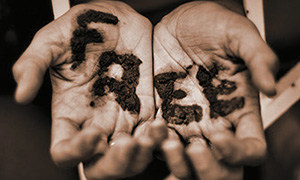
A nation of former slaves stood beneath the mountain listening to the voice of Hashem. Ten seminal commandments were engraved upon stony tablets, summarizing fundamental theological and moral values. After the fireworks of Sinai subsided, the rest of the Torah was delivered. Before any rituals, ceremonies or prohibitions are described, civilian laws are outlined. The word of Hashem is meant to fashion an idyllic moral society governed by the rule of law. By listing the laws of torts, damages, contracts and litigation prior to any list of rituals, the Torah stresses the primacy of ethics in religious life. Justice and morality are the foundation of religious experience. If the infrastructure is flimsy the entire structure will topple. Without morality and justice, religion cannot be sustained.
This extensive system of commercial laws and judiciary procedures is introduced with specific laws governing slaves. In particular, the opening section of Mishpatim highlights the various methods by which a slave can achieve freedom. Additionally, these verses describe the harsh penalty for those who opt into lifelong slavery. Ear piercing is meant to deter people voluntarily choosing permanent slave status. The halachot of the Torah are launched with the laws of liberating slaves.
Actually, according to the midrash, well before redemption even began, the Jews had already been instructed to emancipate their slaves. Bizarrely, Moshe’s initial announcement of redemption from Egypt was preceded by instructions about releasing slaves. Astonishingly, Jews who were themselves mired in Egyptian bondage were now cautioned to release their own slaves. As they didn’t own slaves, this directive wasn’t a legal mandate but an important educational message.
The Exodus from Egypt introduced bold new concepts to human consciousness. Hashem descended into His world, debunking ancient pagan myths, while introducing basic tenets of monotheism. Additionally, by liberating us, Hashem reinforced ancient commitments to our forefathers, and selected us as His chosen nation. Beyond theology and Jewish history, Yetziat Mitzrayim also presented crucial social and political values to humanity. Chief among these values is a revulsion for human slavery. Every human being is created equally in the image of God and none should ever be enslaved by another. Slavery distorts the innate dignity of the human condition.
Not only does slavery vandalize the Divine image in every man, but it also obstructs our service of God. If we are subject to human authority, we cannot be completely dedicated in our subservience to Hashem. Quoting this concern, the Talmud allows day laborers to prematurely withdraw from their contracts. Man is not meant to serve any human dictator or be unconditionally subject to any human boss.
Liberating millions of slaves from the tyranny of Egypt underscored the abhorrence of slavery. By instructing Jewish slaves to one day release their own slaves, Hashem demonstrated His contempt of slavery. Having learned, firsthand, the horrors of dehumanization and slavery, we were meant to stand for something different. We were meant to teach the world about human nobility and dignity. By inserting the mitzvah of freeing slaves into the very onset of Mishpatim, the Torah broadly and loudly voices its disgust with this institution. It took humanity thousands of years, but finally man realized that slavery is an abomination.
The Torah presents an ideal that would not materialize for centuries. The ancient world, without advanced sources of energy and without machines, was deeply dependent upon massive levels of manual labor. Without manual labor, agriculture, transportation, construction and other areas of life would stall. Furthermore, the ancient world struggled to produce enough food for its population, and often the institution of slavery offered shelter and food to those unable to provide for themselves. Additionally, the ideals of social equality and human dignity had yet to enter human consciousness. In a world pivoted upon rigid social and political hierarchies, slavery wasn’t viewed as immoral. For a large part of history, humanity was stuck living with a backward and discriminatory institution. This was not the will of Hashem.
Yet, recognizing that an evolving society would nonetheless continue to practice slavery, the Torah provided guidelines. These guidelines are not meant to validate slavery but to provide corrective rules to moderate the brutality of slavery. Slavery was never preferred, but if it were to occur, it must be regulated and moderated. The Torah provides slaves with multiple “exit strategies” and it all but abolishes multi-generational
bondage. Female slaves, who are even more vulnerable, must be freed upon reaching puberty. Commenting upon the care and respect displayed to Jewish slaves, the Talmud issues a hyperbole: “An owner must treat his slave as a master.” Though the conditions of non-Jewish slaves are more harsh, they too musn’t be treated as mere chattel. Any major bodily harm or injury caused by the owner is legal cause for termination. Though the Torah doesn’t idealize slavery, it still provides guidelines to partially civilize it.
Thankfully, the modern world has mostly abolished slavery. Technology has automated much of our labor and advanced agricultural methods have provided sufficient food to feed our planet. The advent of democracy underlined the value of personal freedom and of basic human rights.
The road to a slaveless society wasn’t always easy. Along the road to industrialization, we faced a challenge of creating humane conditions in newly founded factories. These horrors of factory conditions led, in part, to the emergence of Marxism, which prophesized a working-class uprising against the wealthy. Modern capitalism learned to provide more civilized factory conditions, and Marxism vanished from the historical stage.
Formal abolition of slavery hasn’t erased cultural barriers or even personal bigotry. These will take more time to fade. Sadly, even in the modern world we still witness crimes of human trafficking, but this crime exists on the criminal margins of society, which has thankfully abolished institutionalized slavery. Apparently, the message of releasing slaves no longer applies in our world. Or so it would seem…
We may not own actual slaves in the classic sense, but we still must avoid dehumanization of people we sometimes—incorrectly—feel superior to. Sometimes we are disrespectful to people who perform subservient functions for us. In every society, people contract “out” services that they can’t or don’t want to perform on their own. Those who provide “skilled services” are generally admired and well respected. For example, we naturally respect doctors who heal us, financial managers who earn profit and teachers who educate us. Regrettably, we don’t always offer the same respect to providers of more menial services. We often feel superior to them simply because they are unskilled and because their services are cheaper and more readily available. A taxi driver provides a service we can’t provide on our own: We either don’t possess our own automobile or are in transit and have no access to our automobile. Either way, we are paying for an unskilled service. It is easy to feel superior or even, God forbid, express our disrespect to people who are “serving” us not as slaves but as “providers.” We may not be treating someone as a slave, but we are ignoring the human dignity Hashem endowed in this person.
At the shiva for my rebbe, Rav Aharon Lichtenstein, I was struck watching the Palestinian maintenance workers of the yeshiva sobbing with grief. They recalled that every erev Rosh Hashanah, Rav Lichtenstein would personally wish each of them a shanah tovah wish, also extending his best wishes to their wives and children. It was one of the many lessons I learned about respecting all of humanity.
Every mitzvah in the Torah possesses timeless application. Hashem instructed us to free slaves. In 2022 that mitzvah demands that we never treat “common” service providers with disrespect. Nobility of character is a product of how much respect we show others.
The writer is a rabbi at Yeshivat Har Etzion/Gush, a hesder yeshiva. He has semicha and a BA in computer science from Yeshiva University as well as a master’s degree in English literature from the City University of New York.













